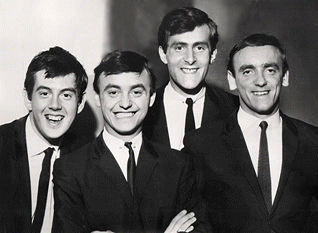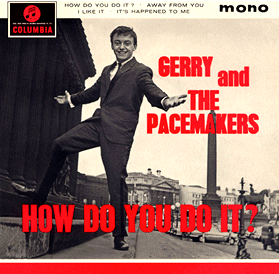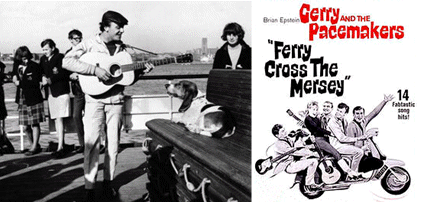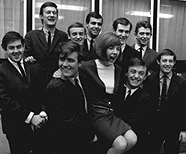Sixties
City presents
a wide-ranging series of
articles on all aspects of the Sixties, penned by the creator of the iconic
60s music paper Mersey
Beat
|
Sixties
City presents
a wide-ranging series of
articles on all aspects of the Sixties, penned by the creator of the iconic
60s music paper Mersey
Beat
|
|||||
|
 |
Gerry
Marsden was born in Liverpool’s Dingle area on 24th September 1942,
the second son of Mary and Frederick Marsden. He lived in Menzies Street,
close to where Ringo Starr was brought up. He left school at 15, initially
working as a coalman, then for a short spell in the Kardomah tea factory
before becoming a railway delivery boy. After his father bought him
an acoustic guitar he decided to form a skiffle group with his elder
brother Fred on drums, Tommy Ryan and Dixie Dean on washboard, Jimmy
Tobin on tea-chest bass and Marty Summers on guitar. Brian O’Hara was
also to join as a guitarist.
Known simply as Gerry Marsden’s Skiffle Group, they made their debut at the Peel Street Labour Party Club in 1958. Their next line-up comprised Gerry, Freddie, Jimmy Tobin on bass, Dixie Dean on washboard and Arthur MacMahon on piano. Gerry then bought his first electric guitar, a Futurama, at Frank Hessy’s for £40. Now 16, Gerry named his group Gerry & The Mars Bars and his father, who was managing the group at the time, wrote to the confectionery company Mars for permission to use the name. They refused, so Gerry, after watching an athletics programme on TV in which the commentator mentioned a ‘pacemaker’, decided to call the group The Pacemakers. By this time Les Chadwick had joined as bass guitarist. The group were to have a repertoire which comprised 250 numbers, including songs such as ‘What’d I Say?’ ‘Skinnie Minnie’, ‘I’ll Be There’, ‘Hallelujah, I Love Her So,’ ‘You’ll Never Walk Alone’, ‘Save The Last Dance For Me’ ‘Will You Still Love Me Tomorrow’ and ‘Jambalaya.’ They began to build a strong following on Merseyside and were one of the groups Allan Williams initially asked to go to the Kaiserkeller club in 1960, before he’d even considered asking the Beatles. Gerry didn’t want to give up his job at the time and turned him down. That they were a bigger Liverpool name than The Beatles at the time is proven by the fact that Williams booked them on the Liverpool Stadium bill with Gene Vincent on Tuesday 3rd May 1960. They also auditioned with the Silver Beatles for Larry Parnes at the Wyvern Club. When Gerry was approached in 1961 to appear at Peter Eckhorn’s Top Ten Club in Hamburg he agreed and the group turned professional. The trip was a success and The Pacemakers returned to Germany on 29th July 1961, enjoying a three-month season at the Top Ten, also taking local singer Faron with them as a second vocalist. |
|
Merseyside disc jockey Bob Wooler featured a list of his personal Top Ten
favourite local bands in Mersey Beat, with the Beatles in the No.1 position
and Gerry & The Pacemakers at No.2. When the official Mersey Beat Poll was
published in January, 1962, The Beatles and Gerry were voted into the first
and second positions respectively by the readers. Having already signed
up the No.1 group in the poll, Brian Epstein decided to sign up Liverpool’s
No.2 band, and he took over the management of Gerry & The Pacemakers in
May 1962. He immediately arranged for the Beatles recording manager George Martin to see them perform in Liverpool, and had them learn ‘How Do You Do It’, a number penned by Mitch Murray, which the Beatles had originally been given to record as their second release. Murray had written it with Adam Faith in mind and was initially unhappy when music publisher Dick James recommended it to George Martin for The Beatles. The Beatles didn’t like the number and deliberately recorded a lacklustre version. As James was still convinced it would be a hit, he suggested it for Gerry and Ron Richards, Martin’s assistant, recorded the Pacemakers' version – which topped the charts. The Record Retailer chart (now Music Week) was regarded as the official chart recognised by the British Phonographic Industry, so when they became No.1 in the Record Retailer chart, they became the first Liverpool group to have a chart topper, beating The Beatles, who only reached No.2 in that chart with ‘Please Please Me (although it topped other charts, such as that compiled by the New Musical Express). Gerry’s second single, another Mitch Murray composition, ‘I Like It’, also topped the British charts. Murray offered them a third number, ‘You Can’t Fool Me,’ but Gerry decided to record ‘You’ll Never Walk Alone’ instead, giving him a hat trick of No.1’s, the first artists in British recording history to achieve such a feat (it placed Gerry & The Pacemakers in ‘The Guinness Book of Records’). No one has bettered this feat, although it was equalled by another Liverpool band, Frankie Goes To Hollywood, exactly 20 years later with, ironically, Gerry’s ‘Ferry ‘Cross the Mersey’ featured on the flipside of one of the No.1 hits, ‘Relax'. |
 
|
  |
Hits in 1964 were ‘I’m The One’, ‘Don’t Let The Sun Catch You Crying’,
‘It’s Gonna Be All Right’ and ‘Ferry ‘Cross The Mersey.’ His two final
hits were in 1965, ‘I’ll Be There’ and ‘Walk Hand In Hand.’ Brian Epstein
tried to steer Gerry & The Pacemakers down the same path as The Beatles
– smart suits by Douggie Millins, photos by Dezo Hoffman, a Gerry & The
Pacemakers Christmas Show, a film ‘Ferry ‘Cross The Mersey’, a Gerry &
The Pacemakers monthly magazine and an American tour with an ‘Ed Sullivan
Show’ appearance in May 1964. In fact, Gerry was so successful on the
Sullivan show that he was booked to appear again the following week.
But Gerry & The Pacemakers weren’t The Beatles. Gerry had already tackled Epstein on the fact that he was taking on too many artists and since he wouldn’t delegate, this had a bad effect on the artists. As the world’s No.1 sensation, The Beatles needed a great deal of attention and, as a result, the other acts suffered. Gerry eventually became an all-round entertainer, appearing in pantomimes and children’s television shows. His ‘You’ll Never Walk Alone’ was adopted by Liverpool FC supporters and became a football anthem throughout Britain. Following the Bradford City Football Club disaster in May 1985 in which 55 people were killed when a fire destroyed a stand, Gerry recorded the number again as a charity disc to raise funds for the relatives of the victims. Under the name The Crowd he enrolled 50 artists to join him on the record. They included Paul McCartney, Zak Starkey, Jim Fagin, Rolf Harris and Kenny Lynch. The number reached No.1 in the charts in June 1985. This provided Gerry with another unbeaten record – the first time an artist had topped the charts with two different versions of the same number. |
After some time appearing on the cabaret circuit he re-formed Gerry & The
Pacemakers with different personnel and continued to tour until his death
on 3rd January 2021.
|
 |
|
Article
Text
UK
web hosting by
|